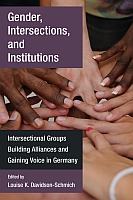Gender, Intersections, and Institutions
Intersectional Groups Building Alliances and Gaining Voice in Germany
Author(s)
Davidson-Schmich, Louise K.
Collection
Knowledge Unlatched (KU)Number
103998Language
EnglishAbstract
Germany serves as a case study of when and how members of intersectional groups—individuals belonging to two or more disadvantaged social categories—capture the attention of policymakers, and what happens when they do. This edited volume identifies three venues through which intersectional groups are able to form alliances and generate policy discussions of their concerns. Original empirical case studies focus on a wide range of timely subjects, including the intersexed, gender and disability rights, lesbian parenting, women working in STEM fields, workers’ rights in feminized sectors, women in combat, and Muslim women and girls
Keywords
Political Science; Public Policy; GeneralDOI
10.3998/mpub.9429790ISBN
9780472130535, 9780472902354, 9780472123216Publisher
University of Michigan PressPublisher website
https://www.press.umich.edu/Publication date and place
2017Grantor
Imprint
University of Michigan PressClassification
Central / national / federal government policies


 Download
Download Download
Download